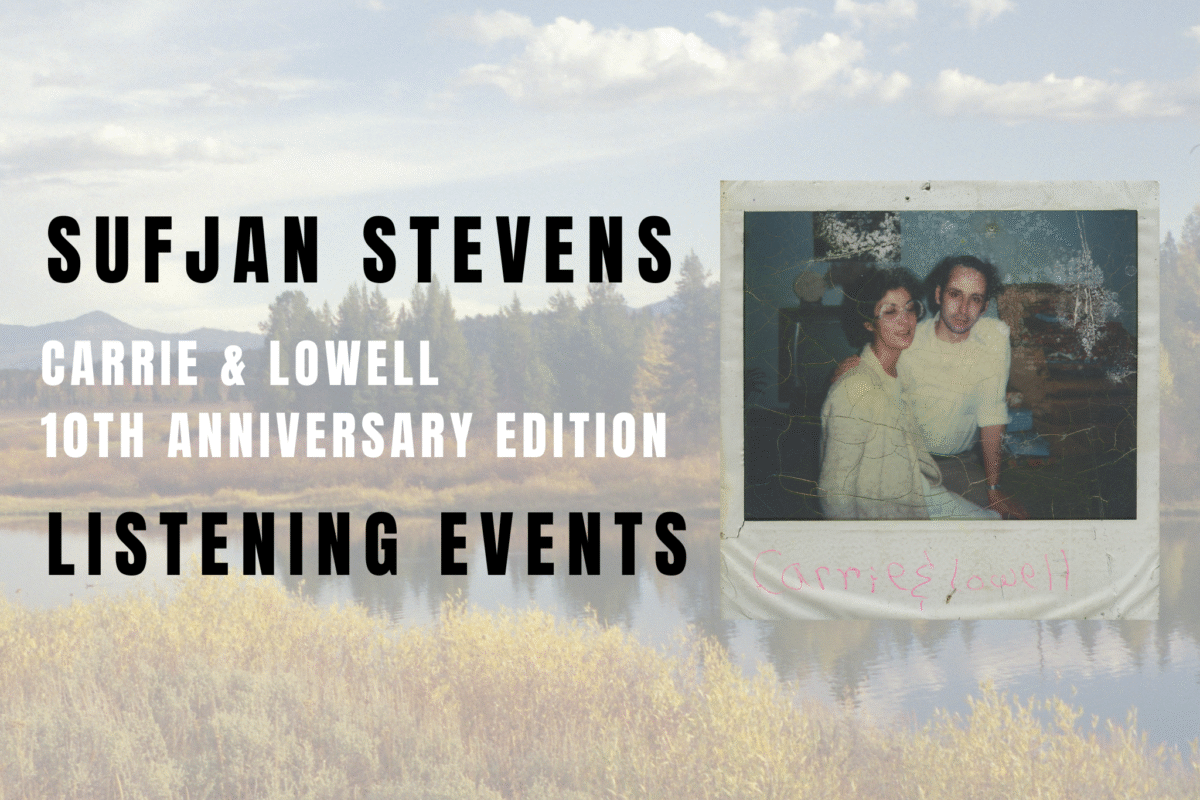Carrie & Lowell – 10th Anniversary Edition: Global Events Announced

PITCHBLACK PLAYBACK SESSIONS
Experience the Carrie & Lowell – 10th Anniversary Edition in full, in complete darkness. These immersive sessions offer a rare opportunity to hear the album without distraction—just you and the music. Pitchblack Playback hosts ticketed listening sessions in the dark on great sound systems around the world for upcoming and classic albums and curated mixtapes.
14 MAY | MANCHESTER, UK @ CULTPLEX
24 MAY | SCHIEDAM, NL @ KODA
26 MAY | COPENHAGEN, DK @ EMPIRE BI
26 MAY | AUCKLAND, NZ @ THE CAPITOL THEATRE
26 MAY | LONDON, UK @ PHOENIX ARTS CLUB
27 MAY | SANTIAGO, CL @ OMNI SOUNDLAB
27 MAY | MEXICO CITY, MX @ SHHH
27 MAY | BRISTOL, UK @ WE THE CURIOUS PLANETARIUM
28 MAY | AARHUS, DK @ ØST FOR PARADIS
28 MAY | PARIS, FR @ LISTENER
28 MAY | BRIGHTON, UK @ THE OLD MARKET
29 MAY | NEW PLYMOUTH, NZ @ LEN LYE CENTRE CINEMA
29 MAY | LOS ANGELES, US @ NEUEHOUSE HOLLYWOOD
GET MORE INFORMATION / ORDER PITCHBLACK PLAYBACK TICKETS
RETAIL LISTENING EVENTS
Be among the first to hear the seven new bonus tracks from Carrie & Lowell – 10th Anniversary Edition — two days before its release (May 28th) — at an in-store listening event near you. You’ll also have a chance to buy the deluxe LP or CD two days early. Admission is free and everyone who comes will receive a free poster featuring original artwork by Sufjan Stevens (while supplies last).
ATLANTA, GA | CRIMINAL RECORDS – 4PM
MELBOURNE, AU | HAPPY VALLEY SHOP – 4:30PM
SAN FRANCISCO, CA | AMOEBA MUSIC – 5PM
NEW YORK, NY | HONEY MOON COFFEE SHOP – 6PM
WASHINGTON, DC | BYRDLAND RECORDS – 6PM
DALLAS, TX | JOSEY RECORDS – 6PM
KANSAS CITY, MO | JOSEY RECORDS – 6PM
TORONTO, ON | SONIC BOOM – 6PM
PORTLAND, OR | MUSIC MILLENNIUM – 7PM
SEATTLE, WA | EASY STREET, CALIFORNIA AVE – 7PM
CHICAGO, IL, US | RECKLESS RECORDS, N. MILWAUKEE
NEWCASTLE, AU | ABICUS
VIRTUAL LISTENING EVENT
No event near you? Join us from anywhere in the world as we host a virtual listening session on YouTube on release day, May 30th. More details coming soon — follow Sufjan on YouTube and stay tuned!
Let's Stay Connected
Get updates on the latest Asthmatic Kitty releases.


